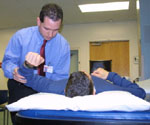PTs among few to bring advanced therapy
by Heather MurphyPublic Relations
On the heels of new South Carolina legislation allowing patients to see a physical therapist without a referral, three MUSC PTs became certified in manual therapy this month.
 Leo
Albano demonstrates manual therapy on another physical therapist. The therapy
relies on “feel” and problem solving.
Leo
Albano demonstrates manual therapy on another physical therapist. The therapy
relies on “feel” and problem solving.
Renee Garrison, Leo Albano, and Paula Workman completed an Advanced Skills course in Maitland’s Australian Approach to Manual Therapy.
For 15 months, the PTs attended classes during five long weekends that included a didactic component, a clinical lab, and written and skills examinations. Faculty from Kaiser Hayward in California flew to MUSC to conduct the sessions.
“It’s a specialization of physical therapy,” Garrison said. “I feel better equipped. It was a wonderful way to expand on the knowledge gained from PT school. You realize that the more you learn, the more there is to learn.”
A therapist of four years, Garrison admires the experts that she worked with during the course and commented on “their unbelievable feel,” or the ability to touch a joint and know almost automatically what’s wrong with the patient.
“With the new legislation, having these skills boosts my confidence in dealing with patients,” Albano said. “Manual therapy really is a tremendous benefit for everyone involved with physical therapy.”
Albano, a seven-year veteran, reported the main focus of the program is problem solving. Garrison echoed Albano and referred to it as “clinical thinking.” The program challenges PTs to think through the patient’s problem using a subjective patient interview, symptoms, and the patient’s medical history to construct a hypothesis for diagnosis.
“By doing it this way, a PT can decide on one or two tests for the patient, instead of using a whole barrage of tests and thus possibly causing an injury to flare up and create more pain,” Garrison said.
“This method is a big asset because PTs don’t always have access to every piece of a patient’s medical history. We have to be able to depend on our minds and our hands,” Albano said.
Workman has been a PT for 16 years and was eager to take the course because of the refreshing approach.
“When I was in PT school, we were taught, ‘Here’s the problem, here’s the diagnosis, and here’s the treatment.’ Because you are actually listening to the patient’s description along with the symptoms and the history, the process gets you thinking about all the different structures that may be involved in the problem.”
While most PTs are briefly introduced to the Maitland concept, at this time, MUSC does not have its own manual therapy program. Albano described a possible program as in the infancy stage and was enthusiastic about what it could mean for MUSC.
“We already have great continuity of care, meaning we have good relationships with our patients,” he said. “Now we have the added advantage of having PTs certified in manual therapy.”
“The best thing about manual therapy is that it’s tailored to the patient,” Workman said.
Garrison mentioned that she and her colleagues have stayed busy since their recent certification trying to pass the knowledge along to other PTs.
“Becoming certified enables us to offer more advanced skills to the community,” she said. “And that’s good for the community and MUSC.”
“Renee, Leo, and Paula’s participation in this program demonstrated
a strong professional commitment. They gave many hours of study and practice
outside of work and I am extremely proud of them,” said Erica Rouvalis,
manager of physical therapy.
Catalyst Online is published weekly, updated as
needed and improved from time to time by the MUSC Office of Public Relations
for the faculty, employees and students of the Medical University of South
Carolina. Catalyst Online editor, Kim Draughn, can be reached at 792-4107
or by email, catalyst@musc.edu. Editorial copy can be submitted to Catalyst
Online and to The Catalyst in print by fax, 792-6723, or by email to petersnd@musc.edu
or catalyst@musc.edu. To place an ad in The Catalyst hardcopy, call Community
Press at 849-1778.